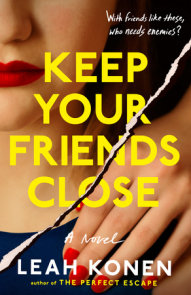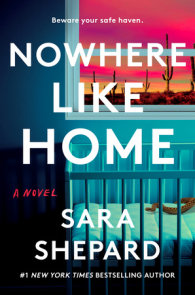READERS GUIDE
Note: These discussion questions contain some spoilers! We suggest you finish the book before you read through them.1. Early in the novel, we see—in flashbacks to Annie’s childhood—how her relationship with her mother parallels Annie’s own relationship with her daughter. In what other ways does the author draw parallels between these three generations of women? How do the flashbacks give us insight into Annie’s relationship with her daughter?
2. Annie notes that when she talks about her family’s experience, “most listeners fill in the blanks with reassuring ‘pull yourself up by the bootstraps’ fairy tales. Refugee success stories that allow them to celebrate the American dream without sharing in the culpability of war.” How is this novel the exact opposite of an American Dream fairy tale? How does the author flip this theme on its head throughout the novel?
3. Annie’s mother carries severe trauma from her experiences as a war refugee. In contrast, Annie’s husband was a former war reporter nicknamed “blood and guts Shaw” and is dealing with his own PTSD from a different war zone. Both are deeply affected by their experiences. How do their mental health struggles affect Annie and Tabby?
4. Annie uses her art to escape both the real world and her own churning mind. Do you think she is still looking for approval from her
mother in her art? Or is her artwork a way out of her mother’s control?
5. After the death of her mother, Annie is no longer able to manage her disgust-driven obsessive-compulsive disorder. Her mom’s OCD took the form of hoarding. Did reading the book change your preconceptions about OCD? How so?
6. Dr. Patel tells Annie that mother-daughter bonds are some of the strongest around but later “the same ties can hold you back, strangle you.” Where do you draw the line between healthy maternal nurturing/protection and harmful coercion/control?
7. Duncan accuses Annie of sounding disgusted by their daughter and making her feel shame— the very same kind of shame that Annie felt from her mother. How is Annie unconsciously passing along her mother’s judgment and negativity?
Do you think it’s possible to completely break the cycle of unhealthy parenting?
8. The recurring refrain throughout the book as Annie’s OCD nightmares come to life is “you know what you did,” but she hasn’t done anything as far as she knows. How does the recurring refrain of “you know what you did” echo the unrest in Annie’s mind and her
OCD-related self-doubt?
9. Annie says, “It’s astounding what the brain can do to protect you from harm, especially when you have no control over what’s happening,” referencing both her own situation as her life spins out of control and her mother’s experience as a war refugee. How is Annie’s brain “protecting” her throughout the novel? Are there feelings she is denying or avoiding?
10. On the outside, Annie appears to have the perfect marriage, but as the novel progresses, we see her internal unrest and dissatisfaction. Why do you think Annie pursues Gabe? In what ways does infidelity show the cracks in the facade of a perfect marriage?
11. How did Annie’s childhood affect her decision to marry Duncan? Do you think she loved him? Did he love her? What other emotions and motivations played a role in their marriage?
12. In an attempt to escape her mother’s control, young Annie leaves for college, bringing an end to one way of life and the beginning of another. At the end of the novel, it turns out someone else has been controlling Annie’s life too. How does this reveal give Annie a new independence? Do you think Annie will be able to break free from the past?






















